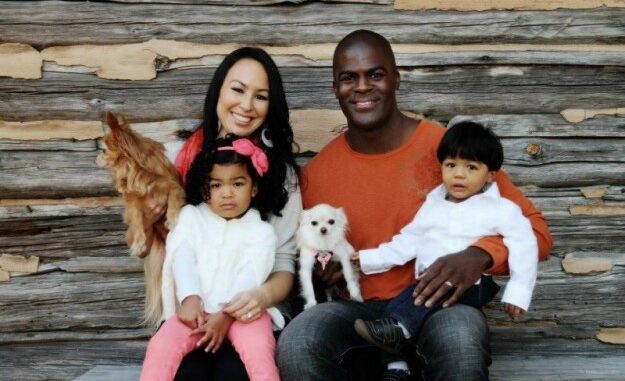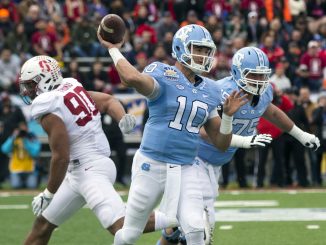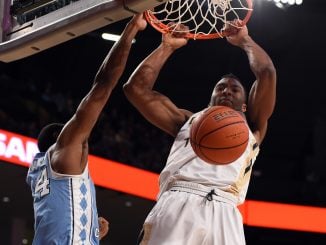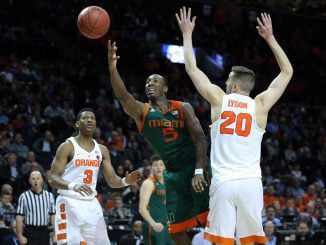
Cancer is something that will touch everyone’s life at some point. For those of us fortunate not to get a diagnosis or a scare, there are friends and relatives who won’t be so fortunate. Shawn Krest has been chosen by the American Cancer Society as one of the Real Men Wear Pink ambassadors for October, which is Breast Cancer Awareness Month. Each day of the month, he’ll be telling a story of how cancer has touched someone on one of the teams we root for. It could be a coach, a player, a retired legend or an arena worker. The disease doesn’t care how successful you are, how much money you have or, as we see in today’s post, if you’re a beloved friend and father in the prime of life. To join in the fight against breast cancer, you can visit Shawn’s American Cancer Society page.
Quincy Monk’s first thought was, “What’s wrong with this iron?”
He was ironing a shirt at home on June 5, 2015 when the iron suddenly fell out of his hand and onto the floor.
“It just came out of nowhere,” he told a local TV station.
Monk assumed the handle had broken, but it turned out the problem was with him, not the iron. His arm had gone numb.
“He was sweating. He was disorientated, and it was really like he couldn’t focus,” his wife, Lisa, told the station.
Monk was having a stroke. His family rushed him to the hospital, and doctors used a newly developed stent procedure to treat him. The story seemed destined for a happy ending, as Monk made a rapid recovery.
“Every hour his speech and his sharpness just kept coming back,” Lisa said.
As Monk continued to progress in his recovery from the stroke, doctors treating him made another discovery. While he was still recovering from his stroke, he was diagnosed with adenocarcinoma, an aggressive form of cancer that develops in glandular tissues. While it was first thought to be affecting his stomach, doctors later determined it was duodenal cancer.
The diagnosis shocked those closest to Monk.
“If it could happen to Quincy it could happen to absolutely anyone — this was a guy in terrific physical condition,” UNC’s radio play-by-play announcer Jones Angell, a high school classmate, said at the time.
Monk played three sports at White Oak High in Jacksonville, North Carolina. He was the quarterback of the football team, played center on the basketball squad and was named MVP of both teams.
“Quincy was a beast,” Danny Davis, a high school rival and teammate at UNC, told the school’s website. “The crazy thing is, he may had been better at basketball than football. He was unstoppable.”
Monk played linebacker and defensive line at Carolina, then went on to play three years in the NFL, but his fierceness on the field was in contrast to his personality off of it. Davis called him “a big, friendly teddy bear” and “the nicest giant ever.”
Another Tar Heel teammate, Kory Bailey, called him, “Literally one of the best men I know. … We always looked up to Quincy.”
More than 100 North Carolina football alumni helped donate to a GoFundMe campaign to help with Monk’s medical expenses.
He struggled with complications while being treated, however. The chemotherapy caused his blood vessels to collapse, limiting blood flow. Doctors put in stents to keep his blood vessels open, but that led to an infection.
On Nov. 24, 2015, Monk died. He was 36 years old and left behind a wife and two young children. it was 172 days after he dropped the iron.
“We actually only had a few short months with him,” his wife said in an email to the North State Journal.
Earlier this year, his teammates donated to UNC to rename the meeting room that the team’s inside linebackers use in his honor.
UNC co-defensive coordinator Tommy Thigpen was just finishing his college career when Monk arrived at UNC. He now meets with the players he coaches in the Quincy Monk Inside Linebacker Room and speaks to them about his former teammates’ impact.
“Leave a legacy,” he tells them. “Make sure generations of players and family know your name. When you bring your family here, it will be the place you’re most proud of.”
Previous stories in the series include the Carolina Hurricanes’ Stelio Mattheos, Ron Rivera, Brian Piccolo and Brett Butler. To donate to the American Cancer Society’s fight against cancer, visit the Real Men Wear Pink campaign page.



